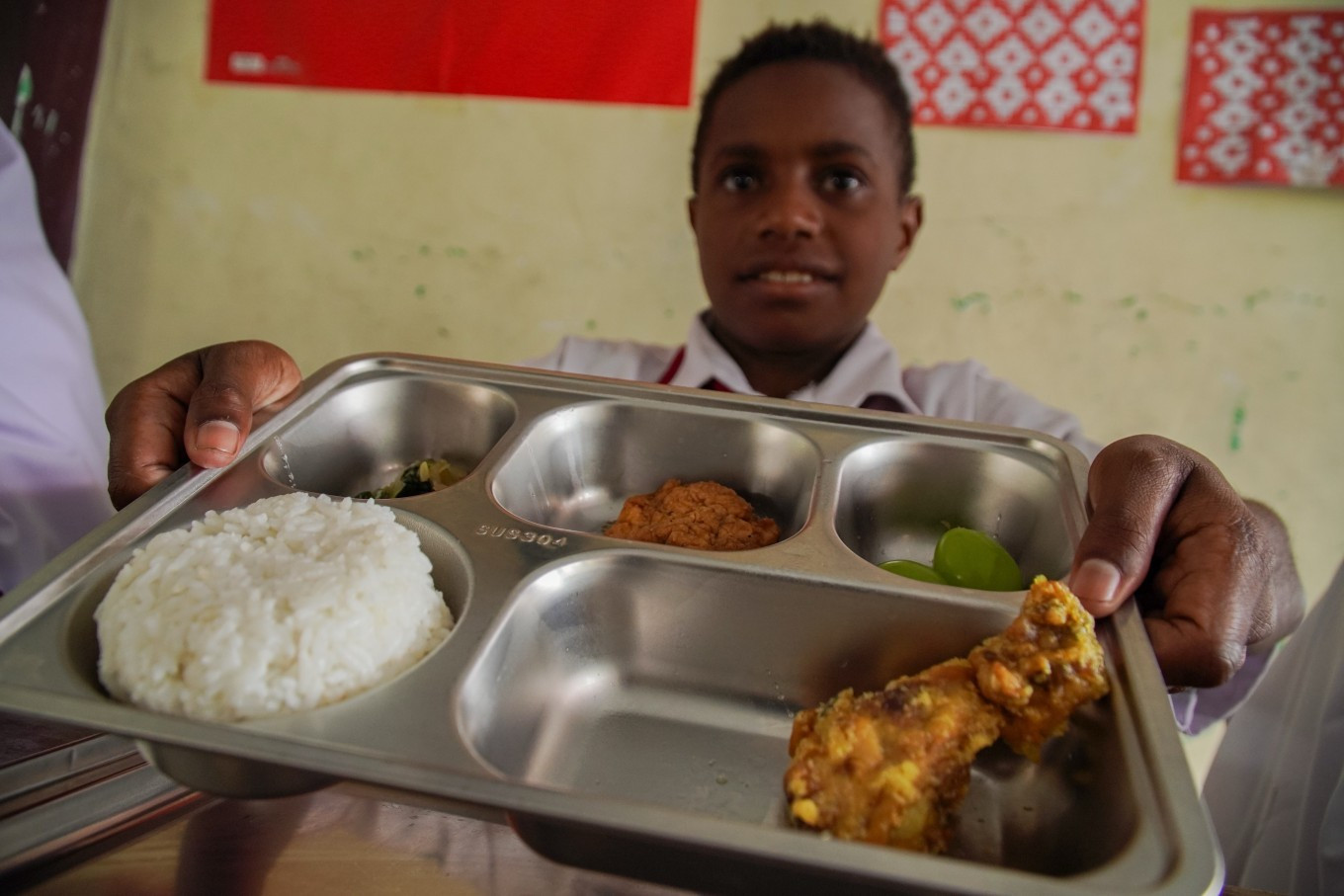News
Humans, not numbers: Crisis poisons Prabowo’s flagship program
Tenggara Strategics October 8, 2025 A student shows a school meal he received as part of the free nutritious meal program on Sept. 15 at the Nurul Islam Klakah integrated Islamic elementary school (SDIT) in Lumajang, East Java. (Antara/Irfan Sumanjaya)
A student shows a school meal he received as part of the free nutritious meal program on Sept. 15 at the Nurul Islam Klakah integrated Islamic elementary school (SDIT) in Lumajang, East Java. (Antara/Irfan Sumanjaya)
Upon returning from his weeklong diplomatic trip, President Prabowo Subianto was forced to quickly shift his focus from international affairs to a domestic crisis.
While he was busy speaking at the United Nations, reports of schoolchildren falling ill with food poisoning from his free nutritious meal program at home skyrocketed. More than 6,000 children across the archipelago have suffered, presenting Prabowo with his biggest test in securing political legitimacy and restoring public trust.
Immediately upon stepping off his plane, he was confronted with the pressing controversy. He acknowledged the outbreak and said a meeting would be held with Dadan Hindayana, head of the National Nutrition Agency (BGN).
Strikingly, the President emphatically declared that the recent events must not be “politicized”.
This claim, however, rings hollow as his entire political legitimacy hinges on the program's success. The free meals program was at the center of his presidential campaign and populist platform. If this program fails, then so will Prabowo’s legitimacy. Earlier this year, Prabowo himself declared he would not run for reelection if he deems himself a failure during this term.
When the first couple of hundred cases of food poisoning occurred in May, Prabowo downplayed the occurrences as a statistical anomaly, stressing that only 200 or so children out of 3 million, just 0.005 percent, had fallen ill.
Now, he has doubled down on that narrative, arguing that out of the 30 million recipients fed, the number of food poisoning cases accounts for a miniscule 0.00017 percent. The arithmetic may appear reassuring, but it reduces a very human crisis to decimals and percentages. Each sick child represents not just a statistic, but a failure in oversight, quality control and accountability.
At the heart of the problem is the sidelining of quality control to achieve unrealistic political targets. When Prabowo first came into office last year, he promised that all 82 million of the country’s children and pregnant women would receive daily meals by the end of 2025 through this program. With the year almost ending and “only” 30 million recipients, the BGN has been scrambling to accelerate distribution, gambling with children’s health as a result.
Following the recent outbreaks, Dadan himself acknowledged this dilemma, stating, “Ultimately, it is about how the target can be met.” This fixation on targets has spawned a network of nutrition fulfillment service units (SPPG) that are expanding faster than they can be regulated. By the BGN’s own admission, only 198 SPPG have secured hygiene and sanitation licenses, yet more than 10,000 units had been built as of last month.
The data itself is inconsistent. Head of the Office of the Presidential Staff Muhammad Qadari revealed an even lower figure, stating that only 34 out of 8,583 SPPG were certified. These inconsistencies deepen the uncertainty and raise questions about whether the government even knows the real scope of the situation on the ground.
Beyond the hygiene crisis, SPPG have also become a hotbed of political patronage. Many are directly owned by institutions linked to both the military (Prabowo’s old employer) and the National Police, fueling suspicions that the program doubles as a vehicle to share lucrative government contracts and the political spoils with different factions.
Concerns over dishonest intentions have also plagued the legitimacy of many SPPG. For most owners with no background in food procurement, the kitchens appear to be less about serving children and more about exploiting one of the largest allocations in the state budget. This year alone, the BGN is targeting Rp 99 trillion (US45.9 billion) for the program. This sum is set for a massive increase next year, with Prabowo promising over Rp 335 trillion of the state budget, equivalent to Rp 1.2 trillion per day.
The issue, however, goes beyond mere profits. The scheme’s design, which routes funds through foundations tied to state institutions, mass organizations and private actors, has fostered a climate of systemic rent-seeking. Transparency International Indonesia and the Ombudsman has documented widespread “fees” shaved off from the designated Rp 15,000 allocation for each portion, sometimes as high as Rp 2,500 per portion, before the money even reaches the kitchens. Each cut translates into lower-quality ingredients and greater risks for children's health.
So far, 56 SPPG have been suspended for their involvement in the outbreaks. But suspension alone will not fix a system riddled with unhygienic kitchens, political favoritism and profiteering.
What this crisis reveals is that greater oversight, while necessary, will never be enough on its own. What is truly required is the political will from the President to build a professional and accountable system, one that treats a program meant for the health and wellbeing of children and pregnant women with the seriousness it deserves.
What we've heard
An energy company executive said the fuel supply crisis at private gas stations was inseparable from A senior official at the BGN said that Prabowo has made the poisoning outbreak one of his priorities to resolve. Prabowo has already asked Dadan to report on the series of poisoning incidents. “The final decision awaits the President’s directive,” he said.

